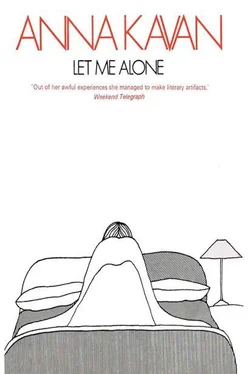But Anna, when she thought of it, felt her heart sicken with horror. She did not want a child either with her body or with her mind. It was not her role. It seemed unnatural, almost shocking to think of such a thing. The thought disgusted her. Yet there were times in the midst of her loneliness, in the midst of the dreadful blankness which her life had become, when a different mood came upon her. At such time she began to tell herself that she should bear a child and be as other women, content to abandon her own life to live again in the child. She almost persuaded herself that she would be happy doing this. That this was her true womanly destiny.
But then, when she thought of Matthew’s child, she shuddered in every nerve. If she could conceive a child of herself and bear it of herself alone, well and good. But Matthew’s child! She shivered at the thought. No, it was not to be thought of, never, never. How could she bear it? How could she bear the thought of producing a curious neat, half-unreal, ball-headed child, a little surprise packet of her own? How could she! Disgust flamed to horror in her heart, she felt revolted. The very idea wrenched her with actual nausea.
So that it distracted her to know that the thought was always in Matthew’s mind. And also in the minds of the other women. There was a rich stir of fecundity abroad among the white women of Naunggyi, a warm, moist surge of philoprogenitiveness. Anna saw it all as so revolting, a sort of human stud-farm.
Mrs. Barry came and leaned against Anna’s new cushions and smiled at Anna suggestively. She was a faded and rather sugary-looking young woman, inclined to prettiness.
‘It must be dull for you here alone,’ she said. ‘Perhaps later on —’ And her pretty, light, slightly blood-shot eyes would gaze eagerly round the room in quest of some telltale oddment of sewing or suchlike.
Anna found it disgusting. It was really repulsive to her, this semi-lewd interest in her reproductive possibilities. She felt herself go hard and cold, very tensely rigid, and sharp, sword-like, in the midst of all this warm, yielding luxuriance of femininity. She seemed to close up more than ever in herself.
None the less, the general atmosphere of breeding and maternity had its effect upon her. She did actually think, occasionally, that she would like a child — provided it was not Matthew’s. More as an occupation than anything else. It would be an interest.
But in her more lucid moments, when the nightmare of the place had retreated a little, she was astonished at her own imaginings. Except that they were not her own. It was not Anna-Marie who indulged in these incongruous flights of fancy. She was not herself. The mere incongruity of associating her real self with procreation made her tremble.
The cool months passed away, with their limpid mornings and floods of bright, pure sunshine. March was already tropical, a steadily increasing onslaught of torridness. The punkah was creaking from morning till night, stirring up the sluggish, lukewarm air. And the shutters were always closed. The sun had become an enemy. So that the rooms were always dim, depressing, yellowish. A queer yellowish light came oozing in, like marsh-water, through the wooden slats of the shutters. By the middle of April it was almost too hot to live. The scourge of heat had fallen like a visitation. Everyone complained in a half-hearted, hopeless way. There was nothing to be done, of course. Except grin and bear it. But it was deathly, dreadful; an abominable infliction. Like one of the mediæval plagues.
Anna could hardly drag herself out of doors. Even the early mornings were burning hot. And the heat seemed to lie upon her like a great, intolerable, irritating mass, crushing out her life. She felt half ill all the time. She had no spirit or energy. She was crushed.
Yet the outside world was wonderful. There was a changing, eerie beauty about the landscape. From day to day it altered, assuming gradually a strange coppery, metallic brilliance, almost orange-coloured, like a Martian landscape. There was something unbelievable about it, really other-worldly. You could imagine yourself on some other planet. And the people, the natives of this other world, changed too, were changing from day to day. As the days went by, a sort of excitement seemed to be working up in them. They went about more. There were always groups of brightly dressed figures going along the roads, bullock-carts bumping along in a Christmas-tree jingle of tassels and little bells, and the sharp, nerve-racking whine of the heavily loaded carts. And suddenly, in the still, burning air, wild music breaking out: the squeal of a pipe, and strange falsetto voices singing, chanting in vibrant cadence, with sudden startling flourishes and bursts of music. And gongs clanging. The strange, deep, powerful, disturbing sound of the gongs, like the yelling, ringing throats of demons. Strangely exciting, it was, to sense the excitement rising in the native world. The magic, the dangerous, sinister thrill of the old Eastern demonology which it brought up.
‘They always go on like that before the rains,’ said Matthew. ‘It will be the same until the rains break.’
And sure enough the excitement went on, day after day it accumulated, the crowds of brilliant figures straying about, like bright leaves speckling the dust-dry earth, the high, unnatural voices singing. Anna felt it more than she could bear, the heat and the suspense, waiting there for the rains to break, in the burning, unearthly solitude, cut off from the world. It seemed to be driving her mad.
There was now a distinct breach between Anna and the rest of the feminine population. Of course it had been hopeless from the start. Quite hopeless for her to expect to get on with them. But she had done her best. She had dined out with Matthew at each house in turn, and had dutifully returned the invitations. But the flatness, the hopeless dreariness of those dinner-parties — it was enough to make one weep. First the dinner itself: the inevitable luxury of tinned asparagus, the cook surpassing himself in some sort of sweet — usually a solid lump of ice with a candle burning inside, as under a transparent bushel — which the men would not condescend to touch, and Matthew being rather sprightly and coy with the ladies at his end of the table. Then the feminine group in the drawing-room, the general atmosphere of feminine confidences, the spate of trivialities, the endless waiting for the men to appear, Mrs. Grove staring out of her insolent wasted face, like a living skull-and-crossbones at the feast, and Anna herself falling gradually silent in an asphyxiation of discomfort and ennui.
She gave it up after a time, the effort to be pleasant and to join in the game. It was no good. She would never succeed — not if she tried for a hundred years. She would never go down with them. So she gave up the attempt.
It was strange to Anna to feel the profound, suspicious dislike which all these kind-hearted women seemed to have of her, just because she was a little different. Because she was not quite as they were, they were hostile, malevolent, affronted. She felt that they would like to do her an injury. She could feel the waves of envious dislike going out against her, because she was young and intelligent, and because the men thought her attractive, in her pleasant clothes.
Yes, the men were attracted towards her: no doubt of that. They talked to her at the club, and escorted her about, and watched her out of the corners of their eyes when they thought she wasn’t looking. Some of them even made tentative advances when Matthew was away. Nothing really definite or compromising. They were all very circumspect. But it was obvious that they wanted to flirt.
Anna would have nothing to do with them. She didn’t care for their conceited, underhand, cautious methods — so patronizing. She was sick to death of the lordly male. But the women were impossible. She couldn’t talk to them. Moreover, they were beginning to avoid her. She seemed doomed to complete isolation.
Читать дальше












